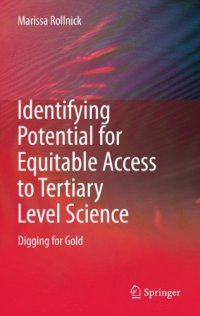
Ebook: Identifying Potential for Equitable Access to Tertiary Level Science: Digging for Gold
Author: Marissa Rollnick (auth.)
- Genre: Computers // Software: Office software
- Tags: Science Education, Higher Education, Mathematics Education, Educational Policy and Politics, Assessment Testing and Evaluation
- Series: Contemporary Trends and Issues in Science Education
- Year: 2010
- Publisher: Springer Netherlands
- Edition: 1
- Language: English
- pdf
Higher education reforms internationally have led to large increases in student numbers, and thus a consequent rise in so-called ‘non-traditional’ and underprepared students who arrive at higher education institutions with a variety of educational backgrounds. The appearance of these students provides a particular challenge in the sciences where adequate grounding is crucial. One response to this challenge has been the provision of access, foundation or “second chance programmes” which operate on different models internationally. This book provides much-needed analysis from researchers in the field, examining the ways in which disadvantaged and underprepared science students learn, as well as which pedagogical approaches have been proven to be effective. The chapters explore the issues more generally before focusing on the ways in which equal opportunities to learn have been implemented in tertiary education in Southern Africa, where models include the provision of access, foundation or ‘second chance’ programmes that have opened the door to vast numbers of new students. In South Africa, where the push for equity has been strong since the demise of apartheid, programmes have been established at all tertiary institutions, with some of the most successful of these programmes based at universities characterised by a high research output. As a result, the last decade has seen a great deal of research into the effectiveness of these programmes both at a micro and macro level. This volume provides an examination of issues related to the programmes, their structure, student selection and adjustment. Issues such as the learning of these students, their communicative ability and laboratory work come under the spotlight. Although examining the issue internationally, the book draws heavily on lessons from South Africa where there has been considerable experience of such programmes.
Higher education internationally is in a state of transition and transformation, leading to an increase in the level of participation, and a consequent increase in number of non traditional and underprepared students. The appearance of these students provides a particular challenge in the sciences where adequate grounding is crucial. One response to this challenge has been the provision of access, foundation or ''second chance programmes'' which operate on different models internationally. In South Africa, where the push for equity is strong in the wake of the apartheid era, programmes have generally been established at all tertiary institutions with some of the most successful of these programmes based at universities characterised by a high research output. Consequently in the last decade there has been a great deal of research into the effectiveness of these programmes both at a micro and macro level. Similar research in other countries exists, but is patchy and often based on small groups of students. This book provides valuable information on what research has to say about disadvantaged and under prepared science students and how they learn - what works and what does not work. It provides an examination of issues related to the programmes, their structure, student selection and adjustment. Issues such the learning of these students, their communicative ability and laboratory work come under the spotlight. Although examining the issue internationally, the book draws heavily on lessons from South Africa where there has been considerably experience of such programmes.